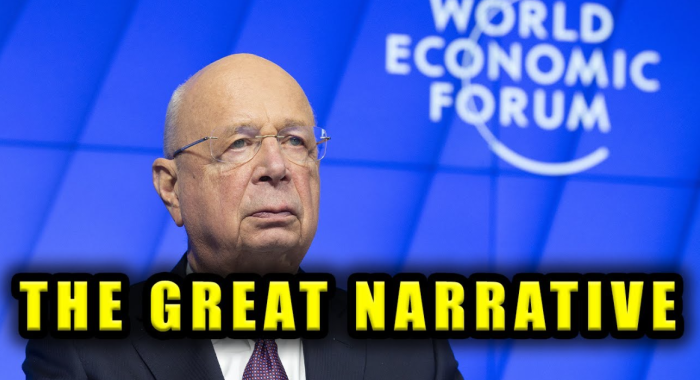

Why and How Does the Global Governance Weaponize the ‘Left’?
by Matt Smyth | Nov 12, 2022
Confronted with the downfall of financialised global capitalism, it would appear necessary in the eyes of its leaders to offer some kind of alternative—even a mythical one—that nevertheless allows for the continuity of the professional managerial class to which they belong.
The process which the global financialised economy is currently undergoing since March 2020 seems to indicate that its governance has begun carrying out a gigantic contraction of the world’s economy.
The virtual annihilation of small and independent businesses is planned, and even that of a large part of big industries. According to a short video from the World Economic Forum, Can the Economy Grow Forever?, most businesses must be shut down in order to switch to ‘post-growth to save the planet’ (under the guidance of AI!).
According to our policymakers, small and medium businesses have to step aside in favour of the major transnational corporations within a gigantic oligopolistic and captive market, therefore without any real competition. It’s the Robber Barons’ old dream come true. Carnegie, Morgan, Vanderbilt and of course Rockefeller—who supposedly said: ‘competition is a sin’—, all of them endeavoured some kind of ‘corporate socialism’ through a monopolistic accumulation of wealth (Antony Sutton. Wall Street and FDR: 1975).
It is also what the central bankers—empowered back in the day by the said Robber Barons—long for. They wish to get rid of mere commercial banks and consequently the credits small businesses depend upon. This coming oligopolistic market dreamt up by the managerial class would extend to everything they can monetise—that is to say to literally everything. It will be a captive market where consumers do not have any real choice regarding what they purchase.
The concentration of productivity and wealth specific to the industrial world, although it has already been well underway since the turn of the millennium, would thus reach a higher stage, possibly its ultimate one. A totally centralised and controlled economy akin to that of Soviet Russia.
The new narrative of the Global Governance could well be summarised with the famous line delivered by Tancredi Falconeri in Tomasi di Lampedusa’s Il Gattopardo: ‘Se vogliamo che tutto rimanga come è, bisogna che tutto cambi!’ (‘If you want everything to stay as it is, you need to change everything’).
The illegitimate spawn of Friedmanism?

Unsurprisingly, it is among conservative circles that the loudest and more visible opposition to this upheaval can be found. Anyone somehow loyal to traditional religious principles or to the very idea of nation cannot abide by the transformation initiated by the Governance—with a capital G since it is currently coming out into the open with the CoViD crisis.
Similarly, most lawyers are standing strong against all this: they wish to remain faithful to a thousand years of teaching on personal rights. This is also the case with Friedman and Mises’ disciples. They are true devotees of the so-called free market economy supposedly brought about by Reagan and Thatcher: in other words, Backbencher Tories, conservative Republicans and various other kinds of libertarians.
One cannot doubt their sincere belief in the autonomy of the individual before the state, in the necessity of strong counterpowers, in the benefit of commercial competition and entrepreneurial freedom, nor in the virtues of universal private property. They stubbornly hold both to the notion of fundamental individual rights and more broadly to that of the state of law. And any kind of collectivism that would threaten the existence of the middle-class is anathema to them—even if it is corporate collectivism.
Actually, these conservative circles are beginning to realise that today’s financial leaders have turned their back on their beloved free-market ideology. Paradoxically, they do not consider that it was this very financialised and globalised world they themselves contributed decisively to shaping in the last decades of the twentieth century, through massive deregulation, privatisation and relocation, that hatched the monster they lambast today.
It is their very free-market ideology that paved the way to the oligopoly now overshadowing our societies. They fail to realise that by definition markets were never free, but in the grip of those who control the supply and demand.
The terrifying spawn of the global financial order they helped to create is no longer willing to bear a legacy that became a burden, but it definitely remains a progeny of the financialised corporate world they built.
The religion of progress

Conversely, it is among what most agree to call the ‘left’ of the political chessboard that this project of a large social re-engineering initiated by the Global Governance finds its staunchest supporters: US Democrats, European Social-Democrat and ‘Green’ parties, and sometimes even—as France has witnessed—the Far Left.
The French Communist Party, the Greens and the Parti Radical de Gauche (of Christine Taubira), were all in favour of mandatory ‘vaccination’ against CoViD. And those on the Left who upheld individual freedom on these matters were the first to underline that they felt isolated within their political family.
There are two main reasons for this: on the one hand the Global Governance has for a long time been setting up its narrative so as to be heard positively by a ‘target market’ receptive to catchwords such as sustainability, net zero emissions, inclusivity, diversity, empowerment, openness, globalism, equality or vegetarianism; at the same time there are quite a few left-wing people attracted to technocracy, state interventionism, planification and authoritarian rule, and they have been around for a long while.
A fascination for technological progress is widespread among the Left. And from now on, those who are receptive to the revamped globalist narrative, characteristic of the so-called ‘stakeholder capitalism’ or ‘responsible capitalism’ personified by the World Economic Forum, are able to join the ‘New’ Left which had shamelessly acknowledged its allegiance to the corporate world from the very start in the 1980s.
Being part of the elite

Since the beginning of modern political history, the fundamental right to individual freedom never stood as a priority for the majority of the Left’s representatives, while a religious veneration of the state’s apparel is deeply rooted within the Left, and even more so among its extremes.
Furthermore, since the nineteenth century, ‘progressive’ left-wing affluent circles are prone to elitism and class contempt. Notably because pesky plebeians tend to ridiculously cling to their petty homeland, even though the logic of human progress leads to globalisation, internationalism, mobility and ‘world citizenship’.
Worse, they fail to understand that their true path to happiness requires them becoming sexless, propertyless and ethnically homogenised nodes running around in an Amazon plant for twelve tokens an hour.
Therefore, a great divide resides between those to whom power ought to be entrusted because they are knowledgeable and those who fatally dwell in ignorance because of their humble social origin—and even in some kind of congenital moral weakness which encourages these people to indulge ins elfish yearning for individual freedom and the protection of one’s local roots.
Progressive elites also agree with the managerial class in hailing the disappearance of the cumbersome middle class—which has been declining since the 1970s anyway. It clings stupidly to its individual rights and to its modest wealth. An ‘hourglass’ society is what they fancy. A society where incomes are polarised: the masses have to settle for cheap stuff (for the good of the planet), while a tiny elite has access to very expensive products and services. It is only justice that they are awarded some compensation for the burden they are willing to bear.
This entitlement to being part of a superior cultural class provides—maybe unknowingly—a sense of kinship with the corporate managerial class, especially if the latter tends to merge with high-ranking national or international civil servants.
Such a feeling is even further encouraged by an instinctive hatred of farmers, artisans, shopkeepers, as well as of the world of small business in general. As for their sympathy for workers, it seems to have vanished long ago, if it ever really existed.
The working class so easily falls prey to ‘populism’, anyway. Consequently, such an elitist leaning tends effortlessly toward authoritarianism: the plebs will be made happy whether they like it or not, since they cannot see where their interests really lie.
Beware of the Bogeyman!

Another skilfully-wrought narrative has had a devastating effect on the critical sense of many left-leaning people. With the help of mainstream media, a few recurring bogeymen have been established as such, along with corresponding pejorative ‘standardised’ adjectives.
This has proven to be amazingly effective in preventing any critique of the official truth. She or he who dares to reject this narrative ends up being tagged with defaming labels such as ‘reactionary’ or ‘conspiracy theorist’…
This is made even easier if, now and again, they are able to display a genuine bogeyman in charge of publicly and loudly defending any viewpoint that could prove dangerous to the Governance. Later on, such ideas and the people who stand up for them are easy to demonise.
During the ‘pandemic’, such was the fate of anyone daring to criticise lockdowns, defend well-proven early treatments, or reject mandated experimental injections. The roll-out of this alleged ‘anti-reactionary’ narrative managed to build in the mind of people sympathetic to this storytelling some kind of equivalence between ‘wokeness’ and Governance’s directives. From there on, ‘Cancel Culture’ takes care.
On the other hand, the directions laid by the Governance, as long as they are appropriately coated with ‘green’ or inclusive catchwords—for the planet, for climate, for gender equality etc.—are swallowed by the ‘woke’ groupthink naively shared by many on the Left, especially young people. With all the energy of juvenile good conscience, they will come to the rescue of transnational corporations’ projects, no matter what.
More of this well-tuned narrative

Actually, Klaus Schwab and his World Economic Forum, who are now in charge of the Governance’s PR, and also BlackRock CEO Larry Fink in his annual Letter to CEOs, or the former central banker and now climate financial czar Mark Carney in his book Value(s): Building a Better World for All (2021) follow that very same ‘woke-friendly’ narrative.
Apart from Elon Musk or Peter Thiel, no public figures from the executives’ world dare to question this narrative.
The message sent by the WEF, Carney or Fink is that of stakeholder capitalism. The underlying notion is that the progressive (for want of a better word) elements of the public are open to a narrative proclaiming the advent of a new ‘responsible’ capitalism, at long last—after finding its Road to Damascus (at Davos)—willing to stop destroying the planet with its short-term profit policy, albeit for the sake of long-term returns. A choice made because of profit, to be sure, but made in a responsible way.
For the same reasons, such a rebranded capitalism is willing to refurbish the state’s prestige since stakeholder capitalism looks forward to teaming up closely with governments through public-private partnerships. The state is also a stakeholder.
Thus, capitalism now invests in large projects which are supposed to rescue public health, reverse global warming, create a sustainable future for mankind and the earth, reach out to minorities, fight inequalities, grant every nation an equitable prosperity… After greenwashing, we are getting socialwashing, inclusivenesswashing and equalitywashing…
A fascination for technology

The history of the Left testifies to some of its representatives being in favour of an ideal society run by professional managers, as long as those managers claim not to have profit as their priority, but merely the desire to run things in harmony with the constraints of technoscience.
Lenin was a partisan of Taylorism and scientific management. He brought in American engineers to Russia as technical advisors to help him with the industrial development of the Soviet Union.
Long before, British Fabianism, heir to Bentham’s communitarian Utilitarianism, was committed to an ‘imperial’ policy (in their own words) of close partnership between state and private sector along the lines of a centrally-planned economy together with strict social control.
The Fabian Society is well known for having founded the London School of Economics (LSE) in 1895. It could be said that technocratic ideology originates with distinguished members of the Fabian Society such as Beatrice and Sidney Webb.
As a matter of fact, Scientism is a belief widely shared on the Left, just as much as the belief in Progress with a capital P. Socialism, Marxism particularly, perceived itself as the manifestation of science within the realm of economics, sociology and politics.
Let us consider eugenics for instance: a pseudoscience through which Scientism takes flesh in a very tangible fashion. There were followers of eugenics throughout the entire political spectrum, but notably within British socialism: Sidney and Beatrice Webb (again), H.G. Wells, George Bernard Shaw, Harold Laski, John Maynard Keynes…
However, in the United States, John D. Rockefeller Sr and Jr, as well as Andrew Carnegie, through their philanthropic foundations, became the main artisans of the eugenic laws adopted by more than twenty-five states during the interwar period.
Even World War Two would not hold back the Rockefellers and other high-profile members of the corporate world—notably from the biomedical sector—from pushing for eugenics.
Such is the context that encouraged the biologist Julian Huxley (Aldous’ brother), a man filled with ideals of social progress who was among the founders of UNESCO and WWF, to rebrand eugenics as transhumanism after the war, for obvious PR motives.
Similarly, in 1989, the British Eugenics Society changed its name to the Galton Institute (after Francis Galton, one the founding fathers of eugenics), and then in 2021 to the Adelphi Genetics Forum (in partnership with the Wellcome Trust, the biomedical philanthropic foundation spawned by pharmaceutical empire GSK).
That both the managerial elite and British technocratic socialism would feel drawn to eugenics makes perfect sense within that cultural context. The country is the birthplace of eugenics, where it was fed both by Utilitarianism and by Social Darwinism, which was grounded in the strong feeling of racial superiority shared by most British politicians of the time.
Members of the ruling class, whether conservative or progressive, were more than happy to consider themselves the product of the survival-of-the-fittest process described by Herbert Spencer, the father of Social Darwinism. On the corporate side, it is no surprise to see that a world vision which tends to deem everything as a potential financial asset ends up considering humans themselves as assets in need of valorisation.
Nowadays the belief in British imperialistic supremacy has made way for a less brutal feeling of mere class superiority, but such feelings remain very much alive among the followers of transhumanism who lurk in Silicon Valley or at the World Economic Forum—riddled by bottomless self-hatred and consequently by a loathing of anything human.
And all communicate the same belief in technological progress as that so obviously displayed by Fabian socialists in their time.
Today, their successors won’t find it very difficult to be lured into an even more radically managerial vision of social regulation, in the name of the great principles they cherish. The more openly technocratic and globalist the Governance’s narrative becomes, the more it is positively received by ‘progressive people’.
Just as collectivist Soviet and Maoist ideologies were welcomed back in the day, a narrative offering a post-capitalist economical system steered by the professional corporate managerial class might also be hailed by vast sections of the Left.
According to the WEF in 2018, economic liberalism is over: ‘We are living in abnormal times. The global liberal order is in an advanced state of meltdown’ (five-facts-you-need-to-understand-the-new-global-order).
Let us all embrace the forthcoming new world order grounded on a bundle of transnational organisations, a handful of oligopolies and gigantic captive markets.
Follow the money…

It should also be remembered that the globalist managerial elite went as far as to exert a shadowy but direct financial influence over quite a few organisations that are normally labelled as left-wing, notably through private corporate ‘philanthropic’ foundations: this is the case with ‘inclusive’ movements (such as ‘transgender’ militant groups) and environmentally-friendly organisations.
Mastercard offers a credit card allowing for everyone to identify as the gender of their choice. Modern capitalism is ‘inclusive’… Eco-friendly groups represent the biggest market target of corporate funding, since a carbon neutral economy and the commodification of natural ‘assets’ are on top of the list of the financial industry’s agenda (check out this very website and Whitney Webb’s Unlimited Hangout for more details!).
Greenpeace (whose chairwoman is an Agenda Contributor to the WEF and whose murky funding through the Tides Foundation originates in Vanguard, State Street, Open Society Foundations, Rockefeller Foundation etc.) or Extinction Rebellion (funded by George Soros’ Open Society Foundations and Trevor Neilson’s Climate Emergency Fund) are under full control of multinational corporations. XR had even launched a very telling ‘business website’, since deleted for PR reasons.
On a broader level, the Bill & Melinda Gates Foundation funds The Guardian, Libération and Le Monde, all newspapers labelled as left-wing. A billionaire, Pierre Omidyar (one of eBay’s founder), funds the left-wing online magazine The Intercept.
Some form of criticism of the Governance’s agenda will be supported, to be sure, but it will be contained in accordance with the ‘limited hangout’ concept theorised by the CIA. Shoshana Zuboff might be able to vilify some aspects of The Age of Surveillance Capitalism in 2019, while in the meantime calling for strict censorship of dissenters on social networks.
Later on, in a 2020 interview with Slate, she backed the official narrative that data extraction during CoViD was absolutely legitimate and harmless, because it was performed under direction of the state, and because it is all too well known that public authorities:
… have no other interest other than to serve the public interest and ultimately exist under the rule of law and under democratic governments because they are public operations.
Amazon, Apple, Nike and the Ford Foundation funded Black Lives Matter. The Open Society Foundations of George Soros are well known for their generosity toward left-leaning movements focusing on gender identity or on the open border policy.
As a matter of fact, while the modern Left wishes to remove all the hindrances restraining migratory flows, so do all globalists—but for very different reasons. Let us consider for instance Peter Sutherland (pictured above): former president of GATT and co-founder of the WTO, chairman of Goldman Sachs and BP, founding member of the WEF, as well as a member of the boards of the Bilderberg Group and the Trilateral Commission…
He became infatuated with the fate of migrants, first as the UN’s Special Representative for International Migration (2006-2017), then at the Vatican where he would preside over the International Catholic Migration Commission from 2015 until his death in 2018. For generous, altruistic and noble motives, no doubt.
Branding

Again, the Governance, and BlackRock’s CEO Larry Fink himself, have no qualms about backing up the fashionable ‘woke’ narrative. They actually make good use of it. Through virtue-signalling, the Governance seeks to be perceived as being on the right side of history.
In doing so, it aims at an urban public which is somewhat educated and well-off, but also confident in technoscience, while at the same time raving about the environment and gender equality.
Repeated calls to altruistic generosity (thus pointing at selfish plebeians) provides a final sugarcoating to this PR.
In the long run, this is all about making sure that at least some part of the population identifies with the policies promoted by the Governance.
Its public representatives such as the WEF and even BlackRock hope to become some kind of institutional incarnation of today’s fashionable narrative. Consequently, they hope to benefit from the visceral rejection of anyone opposing this ‘woke’ narrative so that, indirectly, anyone criticising the Governance’s directives is ipso facto recognized, by some kind of innate reflex, as being by definition reactionary, bigoted, obscurantist, misogynistic, homophobic, transphobic, uneducated, paranoid conspiracy theorist, xenophobic, selfish, irresponsible, exclusionary, anti-science, unfriendly to the environment, cruel to animals etc.
As a matter of fact, the tendency today in the marketing world is to try and create a ‘feedback loop’ between a product’s brand and its target. At the end of the day, it means that the client internalises his identification with the brand: the latter is able to build a ‘cool’ narrative around the product and its owner, who therefore becomes ‘cool’ too, as opposed to those who don’t want the product and are therefore ‘uncool’.
Such a narrative is meant to convincingly ascribe an emotional and symbolical value to the said product—and is thus meant to convey a powerful ‘storytelling’. The product endows its owner with a specific self-image that reflects through his lifestyle the type of character he desires to be identified with (this was already the goal of the new individualistic marketing techniques engineered in the 1980s).
And this image is precisely what the brand recycles at the same time through its own image. For the brand’s identity to be validated adequately on every side, it is essential that the narrative is repeated indefinitely within the commercial cycle.
This is how a form of reciprocal branding gets established: it creates an osmosis between the brand and its client. The latter, when buying clothes, will go as far as to pay good money for the right to sport her or his fetish brand, thus providing the said brand with free advertising, since her or his identity is so deeply invested in the brand.
When the Governance manages to personify some kind of happy modernity to the point where its target audience identifies with this branding, then it has succeeded: the narrative is internalised—at least by this particular target audience.
The WEF, notably, hopes to epitomise this particular branding. To do so, it relies on its friends who pretend to come from outside the corporate world: ‘celebrities’, intellectuals and even religious figures: first and foremost Greta Thunberg, but also Prince—now King—Charles, Jennifer Morgan of Greenpeace (WEF agenda contributor), Kenneth Roth of Human Rights Watch (WEF Young Global Leader), Leonardo di Caprio, U2’s Bono (who is also an investment fund manager but socially responsible), Pope Francis…
The latter is particularly dedicated to the good news of stakeholder capitalism, which he spreads with the help of the Council for Inclusive Capitalism.
They all criticise the market economy, and the consumerism and commercial competition that come with it, or at least what they deem as the flaws of market economy.
They are proud to say that they worry about capitalism’s negative externalities, notably regarding social inequalities and environmental impact. According to Pope Bergoglio: ‘we can heal injustice by building a new world order based on solidarity’.
In the wake of this attempt to rebrand capitalism itself, the WEF is even able to recruit to its cause left-wing intellectuals such as economist Esther Duflo (WEF Young Global Leader), Thomas Piketty (WEF Agenda Contributor), and Chrystia Freeland (WEF Board of Trustees) now of the Canadian Treasury but who wrote Plutocrats: The Rise of the New Global Super Rich and the Fall of Everyone Else (2012), or more covertly Naomi Klein—who faithfully preaches the doctrine of stakeholder capitalism in her latest books on global warming, and fiercely defended the Covidian health policies, notably the vaccine mandates.
A narrative that allows people to dream of the future

Furthermore, Klaus Schwab hopes to gain the trust of the future subjects of the new world order for his technocratic agenda through a new episode of his marketing offensive, this time based on a ‘Great Narrative’ laced with feelgood catchwords such as collaboration and empathy.
The various texts gathered by Klaus Schwab (and Thierry Malleret as usual) in The Great Narrative. For a Better Future (2021) bet on technoscience, notably genomic editing and cybernetic prowess, to make the plebs dream of the Fourth Industrial Revolution.
Similarly, green, inclusive and socially responsible stakeholder capitalism, along with ‘impact capitalism’—its spearhead meant supposedly to transform our world for the better— are supposed to be greeted with enthusiasm by the plebs.
Let’s face it: the Covidian myth has its limitations. It cannot operate on a long-term basis and does not convey any form of genuine faith in a project of transforming society.
Incidentally, The Great Narrative acknowledges something huge: the trust people put in the managerial elite and its institutions is rapidly eroding.
Actually, the theme of the Davos Summit of Spring 2022 was Restoring Trust. According to Oxford University’s Ngaire Woods (WEF Agenda Contributor and IMF advisor), at the WEF regional summit on The Great Narrative held in Dubai in November 2021:
… the good news is the elite across the world trust each other more and more, so we can come together and design and do beautiful things together. The bad news is that in every single country they were polling, the majority of people trusted their elite less. So we can lead but if people aren’t following we aren’t going to get to where we want to go.
This could well be some kind of desperate attempt by the Global Governance to legitimise its authority born out of the international public-private partnership laid by capitalist stakeholders through their technocratic endeavour.
Therefore, the Governance dares to appear in broad daylight while unfolding its ‘great narrative’, meant to become the new founding myth of our supposedly future technocratic civilisation.
Anyone familiar with Yuval Noah Harari’s ideas will recognise a thesis which the quasi-official philosopher of the Davos Summit proposed in Sapiens (2011)—without much consideration for the reality of the facts upon which he was making his argument.
According to Harari, humans build their societies through imaginary narratives created to foster arbitrary and fictional ethical community rules. As for the Governance’s narrative, it is obviously desperate to provide some meaning for what is taking place, with its one and only solution: bestowing even more power and control to a tiny transnational elite who will provide even more technology as a single answer to human problems.






0 Comments